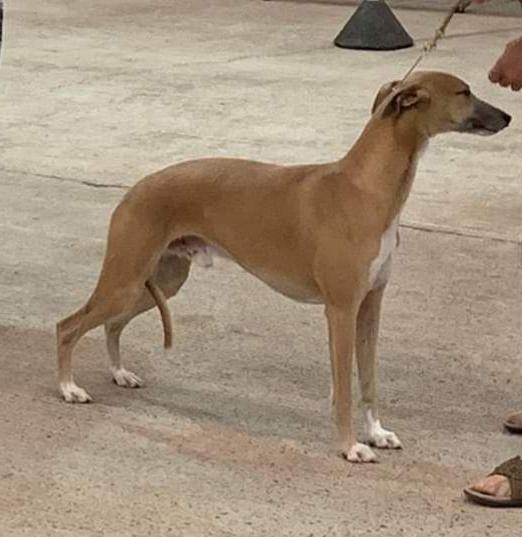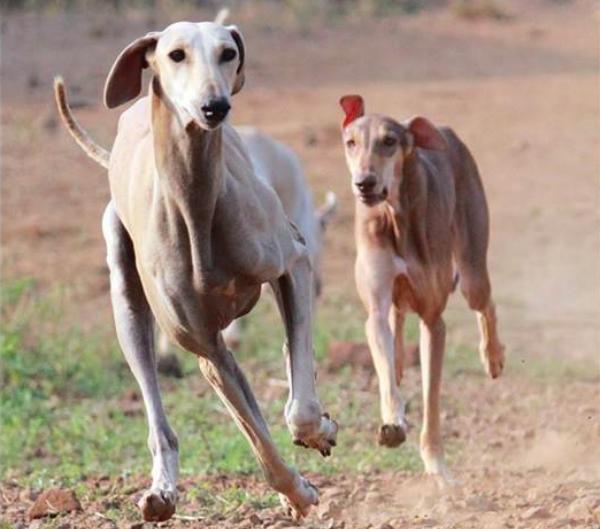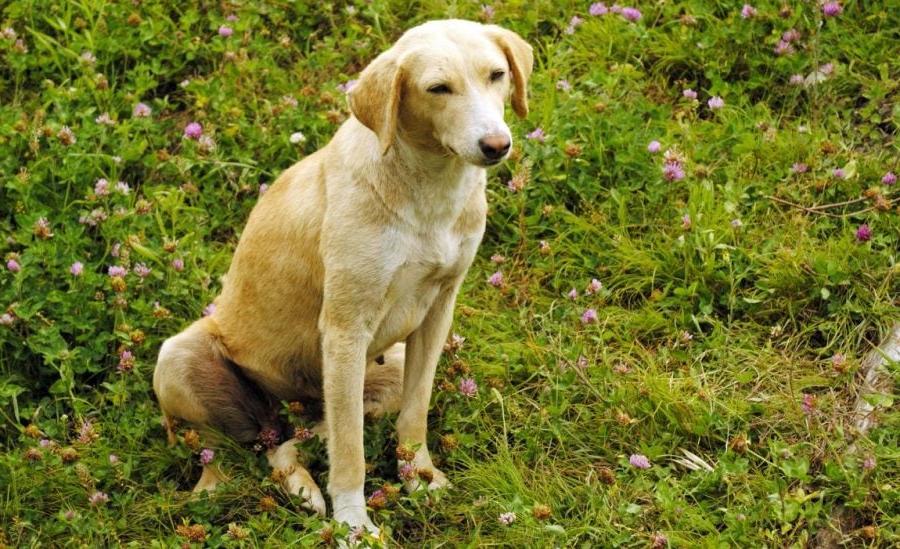- Breed Category: Sighthound
- Country of Origin: India
- Average Height: Males 65-75 cm, Females 60-70 cm
- Average Weight: Males 25-30 kg, Females 20-25 kg
- Average Life Span: 10-12 years
- Grooming Requirements: Low, occasional brushing
- Exercise Requirements: High, needs daily exercise
- Coat Type: Short and dense
- Coat Color Variations: Fawn, brindle, black
- Shedding Level: Moderate
- Ear Type: Semi-pricked
- Tail Type: Long and curved
- Temperament: Loyal, alert, independent
- Intelligence Level: High
- Barking Tendency: Low
- Compatibility with Children: Good with proper socialisation
- Compatibility with Other Pets: Varies, needs socialisation
- Training Ease: Moderate, requires patience
- Common Health Issues: Hip dysplasia, eye problems
- Dietary Needs: High-quality, balanced diet
- Energy Level: High
- Drooling Tendency: Low
- Sensitivity to Weather: Sensitive to cold
- Overall Maintenance Level: Moderate
- Original Purpose: Hunting and guarding
- Apartment Friendly: Not ideal, needs space
- Best Suited For: Active families, rural settings
- Cost of Ownership: Moderate
- Unique Traits: Excellent sight and speed
- Cultural Significance: Valued by nomadic tribes
Ever heard of the Banjara Hound? This unique breed might just surprise you with its fascinating history and distinct characteristics. Known for their agility and keen senses, these dogs have a rich heritage that dates back centuries. Originating from India, the Banjara Hound was traditionally used by nomadic tribes for hunting and guarding. Their loyalty and intelligence make them exceptional companions, but they also require specific care to thrive.
In this article, we’ll dive into the captivating world of the Banjara Hound. We’ll explore their history, uncover their unique traits, and provide insights into their care. Whether you’re a seasoned dog owner or just curious, you’ll find plenty to learn about this remarkable breed.
The Banjara Hound: A Glimpse into Its Origins and Characteristics

Early Development of the Breed
The Banjara Hound has roots that stretch back to ancient times. Developed by the Banjara people, a nomadic tribe in India, these dogs were bred for their speed and endurance. They were essential for survival, helping their human companions hunt game across vast terrains. Over generations, the breed was refined to enhance its hunting prowess and adaptability to different environments.
Role in Traditional Hunting and Nomadic Life
In the nomadic lifestyle, the Banjara Hound was more than just a pet; it was a vital partner. These dogs excelled in tracking and capturing prey, making them indispensable for providing food. Their keen senses and agility allowed them to navigate the challenging landscapes alongside their human counterparts, ensuring the tribe’s sustenance and safety.
Key Historical Figures and Regions
The Banjara Hound is closely linked to the Banjara people, who roamed regions like Rajasthan and Maharashtra. These areas are known for their rugged beauty and diverse wildlife, which shaped the breed’s development. The hound’s history is intertwined with the cultural tapestry of these regions, reflecting a deep bond between the people and their dogs.
Physical Characteristics
With a sleek, muscular build, the Banjara Hound is designed for speed and agility. Their coat is short and dense, often in shades of fawn or brindle, providing protection against the elements. Their expressive eyes and alert ears give them an intelligent and attentive appearance, while their lean frame allows for swift, graceful movement.
Appearance and Unique Traits
The Banjara Hound stands out with its sleek, athletic build, perfectly crafted for speed and endurance. Their coat is short and dense, typically in shades of fawn or brindle, which not only adds to their striking appearance but also offers protection from the elements. You might notice their expressive eyes and alert ears, which give them an intelligent and attentive look. This breed’s lean frame allows for swift, graceful movement, making them a sight to behold when in motion.
Temperament and Behaviour
When it comes to temperament, the Banjara Hound is known for its loyalty and intelligence. These dogs are naturally alert and make excellent companions for those who appreciate an active lifestyle. They thrive on mental and physical stimulation, so regular exercise and engaging activities are a must. While they can be independent thinkers, their strong bond with their human companions makes them eager to please and easy to train with the right approach.
Personality Traits and Suitability

Typical Personality Traits
The Banjara Hound is a fascinating blend of loyalty and independence. These dogs are fiercely devoted to their families, yet they possess a streak of independence that makes them unique. Their energy levels are high, so they’re always up for an adventure or a long walk. This combination of traits makes them both reliable and intriguing companions.
Suitability as a Family Pet and Hunting Companion
As a family pet, the Banjara Hound is a great choice for active households. They thrive in environments where they can be part of the action, whether it’s a family outing or a hunting trip. Their history as hunting dogs means they have a natural instinct for tracking and retrieving, making them excellent partners for those who enjoy outdoor pursuits.
Interaction with Children and Other Animals
These hounds are generally good with children, especially if they’re raised together. Their playful nature and patience make them suitable playmates. However, their hunting instincts mean they might not always get along with smaller animals, so early socialisation is key to ensuring harmony in a multi-pet household.
Training and Exercise Needs
Training a Banjara Hound can be a rewarding experience. They’re intelligent and eager to learn, but their independent nature means they respond best to positive reinforcement and consistency. Regular exercise is crucial to keep them happy and healthy. Long walks, runs, and interactive play sessions will help channel their energy and keep them engaged.
Training, Exercise, and Health of the Banjara Hound

Importance of Early Training and Socialisation
Getting a head start on training and socialisation is crucial for the Banjara Hound. These dogs are naturally intelligent and curious, so introducing them to various environments, people, and other animals early on helps them grow into well-rounded adults. This early exposure can prevent behavioural issues and ensure they adapt well to different situations.
Recommended Training Techniques
When it comes to training, positive reinforcement is the way to go. Banjara Hounds respond well to rewards and praise, making them eager learners. Consistency is key, so regular training sessions will help reinforce good behaviour. Avoid harsh methods, as these can lead to resistance and stress.
Daily Exercise Requirements and Activities They Enjoy
These hounds are high-energy dogs that need plenty of exercise to stay happy and healthy. Daily walks, runs, and playtime are essential. They love activities that challenge their agility and intelligence, like fetch or obstacle courses. Keeping them active not only satisfies their physical needs but also strengthens your bond.
Health and Lifespan
The Banjara Hound is generally a healthy breed with a lifespan of around 12 to 15 years. Regular vet check-ups, a balanced diet, and proper exercise are vital to maintaining their health. Like all breeds, they can be prone to certain genetic conditions, so it’s important to be aware of any potential health issues.
Health and Care of the Banjara Hound

Common Health Issues
While the Banjara Hound is generally robust, they can be prone to certain health issues like hip dysplasia and eye conditions. Regular vet visits are crucial to catch any potential problems early. Keeping an eye on their weight and ensuring they have a balanced diet can also help prevent joint issues.
Average Lifespan and Health Tips
These hounds typically live between 12 to 15 years. To keep them healthy, provide a nutritious diet and ensure they get plenty of exercise. Regular check-ups with the vet will help monitor their health and catch any issues before they become serious.
Preventative Care Recommendations
Preventative care is key for the Banjara Hound. Regular vaccinations, flea and tick prevention, and dental care are essential. Keeping their living environment clean and safe will also contribute to their overall well-being.
Grooming and Maintenance
Their short, dense coat is low-maintenance, requiring only occasional brushing to remove loose hair. Regular nail trimming and ear cleaning will help prevent infections. Bathing should be done as needed, depending on their activity level and environment.
Coat Care and Grooming Routines

Shedding and Seasonal Grooming Tips
The Banjara Hound’s short, dense coat is relatively low-maintenance, but it does shed, especially during seasonal changes. Regular brushing helps manage shedding and keeps their coat looking sleek. During peak shedding times, a more frequent brushing routine can help keep loose hair under control. A good quality brush designed for short-haired breeds will make this task easier and more effective.
Bathing should be done as needed, depending on their activity level and environment. Over-bathing can strip natural oils from their skin, so it’s best to keep it minimal. Always use a dog-specific shampoo to maintain their coat’s health.
Diet and Nutrition
A balanced diet is crucial for the Banjara Hound’s overall health and vitality. High-quality dog food that meets their nutritional needs is essential. Look for options rich in protein to support their active lifestyle and lean muscle mass. Including omega fatty acids can also help maintain a healthy coat and skin.
Portion control is important to prevent obesity, which can lead to joint issues. Regularly monitor their weight and adjust their food intake as needed. Fresh water should always be available to keep them hydrated, especially after exercise.
Nutritional Needs and Feeding Guidelines for the Banjara Hound

Nutritional Needs for Optimal Health
The Banjara Hound thrives on a diet rich in protein to support their active lifestyle and lean muscle mass. Look for high-quality dog food that includes essential nutrients like omega fatty acids for a healthy coat and skin. Avoid foods with excessive fillers or artificial additives, as these can lead to health issues over time.
Foods to Include and Avoid
Include lean meats, fish, and vegetables in their diet for balanced nutrition. Avoid foods high in fat and sugar, as these can contribute to obesity and related health problems. It’s also wise to steer clear of foods that are toxic to dogs, such as chocolate, grapes, and onions.
Feeding Schedules and Portion Recommendations
Establish a consistent feeding schedule, typically twice a day, to maintain their energy levels. Portion control is crucial to prevent obesity, so adjust their food intake based on their activity level and weight. Always provide fresh water, especially after exercise.
Fun Facts and Trivia
Did you know the Banjara Hound’s keen senses make them excellent at detecting changes in their environment? This trait, combined with their agility, made them invaluable to nomadic tribes. Their unique history and characteristics continue to fascinate dog enthusiasts worldwide.
Interesting Tidbits and Famous Banjara Hounds

Interesting Tidbits about the Breed
The Banjara Hound, with its roots in the nomadic tribes of India, is a breed that carries a rich tapestry of history. Known for their exceptional speed and agility, these dogs were once the trusted companions of the Banjara people, aiding in hunting and protection. Their ability to adapt to various terrains and climates is a testament to their resilience and versatility. Interestingly, the Banjara Hound’s keen sense of smell and sight made them invaluable in tracking game, a skill that remains impressive to this day.
Famous Banjara Hounds in Media or History
While the Banjara Hound may not be as widely recognised in mainstream media as some other breeds, their historical significance is noteworthy. These hounds have been celebrated in regional folklore and stories, often depicted as loyal and brave companions. In recent years, efforts to preserve and promote the breed have brought them into the spotlight, highlighting their unique qualities and cultural importance. Their presence in documentaries and articles about India’s diverse canine heritage has helped raise awareness and appreciation for this remarkable breed.
Final Thoughts
The Banjara Hound is a remarkable blend of history and agility. This breed’s loyalty and intelligence make it a unique companion for active families. While they require dedicated care and exercise, the rewards of owning such a devoted and capable dog are immense. Embracing the Banjara Hound means welcoming a piece of cultural heritage and a loyal friend into your life. Consider adopting this extraordinary breed and experience the joy of a truly exceptional canine companion.
